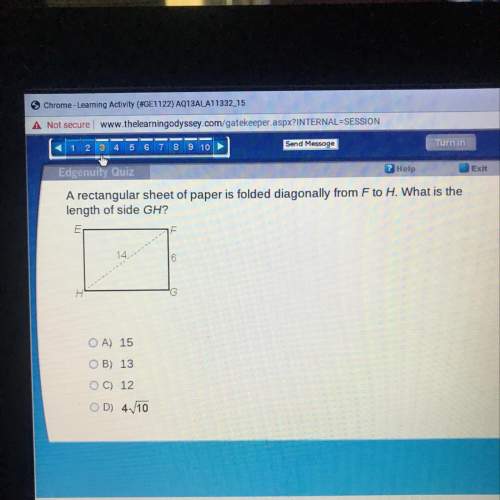
Mathematics, 08.04.2020 23:21, maliyah7516
The rule is applied to ΔFGH to produce ΔF"G"H". On a coordinate plane, 2 triangles are shown. Triangle F G H has points (1, 1), (4, 5), (5, 1). Triangle F prime G prime H prime has points (negative 1, negative 1), (negative 4, negative 5), (negative 5, negative 1). What are the coordinates of vertex F" of ΔF"G"H"? (4, –1.5) (4, –0.5) (–1.5, 4) (–0.5, 4)

Answers: 2
Other questions on the subject: Mathematics

Mathematics, 21.06.2019 19:30, Jenan25
Consider this equation. |y + 6| = 2 what can be concluded of the equation? check all that apply. there will be one solution. there will be two solutions. the solution to –(y + 6) = 2 will be also be a solution to the given absolute value equation. the solution(s) will be the number(s) on the number line 2 units away from –6. the value of y must be positive since the variable is inside absolute value signs.
Answers: 1

Mathematics, 21.06.2019 23:00, kj44
Each of the following data sets has a mean of x = 10. (i) 8 9 10 11 12 (ii) 7 9 10 11 13 (iii) 7 8 10 12 13 (a) without doing any computations, order the data sets according to increasing value of standard deviations. (i), (iii), (ii) (ii), (i), (iii) (iii), (i), (ii) (iii), (ii), (i) (i), (ii), (iii) (ii), (iii), (i) (b) why do you expect the difference in standard deviations between data sets (i) and (ii) to be greater than the difference in standard deviations between data sets (ii) and (iii)? hint: consider how much the data in the respective sets differ from the mean. the data change between data sets (i) and (ii) increased the squared difference îł(x - x)2 by more than data sets (ii) and (iii). the data change between data sets (ii) and (iii) increased the squared difference îł(x - x)2 by more than data sets (i) and (ii). the data change between data sets (i) and (ii) decreased the squared difference îł(x - x)2 by more than data sets (ii) and (iii). none of the above
Answers: 2

Mathematics, 21.06.2019 23:00, Lizethh1
Acaterer knows he will need 60, 50, 80, 40 and 50 dinner napkins on five successive evenings. he can purchase new napkins initially at 25 cents each, after which he can have dirty napkins laundered by a fast one-day laundry service (i. e., dirty napkins given at the end of the day will be ready for use the following day) at 15 cents each, or by a slow two-day service at 8 cents each or both. the caterer wants to know how many napkins he should purchase initially and how many dirty napkins should be laundered by fast and slow service on each of the days in order to minimize his total costs. formulate the caterer’s problem as a linear program as follows (you must state any assumptions you make): a. define all variables clearly. how many are there? b. write out the constraints that must be satisfied, briefly explaining each. (do not simplify.) write out the objective function to be minimized. (do not simplify.)
Answers: 1
Do you know the correct answer?
The rule is applied to ΔFGH to produce ΔF"G"H". On a coordinate plane, 2 triangles are shown. Triang...
Questions in other subjects:

Mathematics, 07.12.2020 06:50

Mathematics, 07.12.2020 06:50

Advanced Placement (AP), 07.12.2020 06:50

Computers and Technology, 07.12.2020 06:50


Social Studies, 07.12.2020 06:50

Mathematics, 07.12.2020 06:50

History, 07.12.2020 06:50

English, 07.12.2020 06:50








